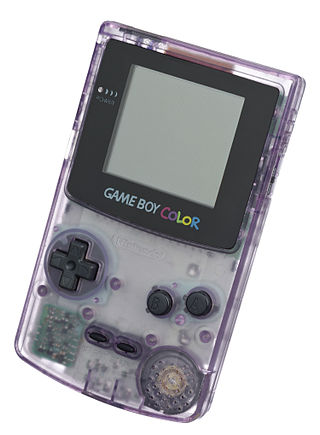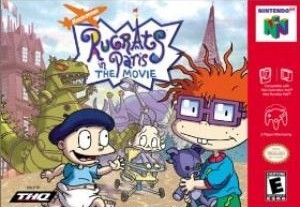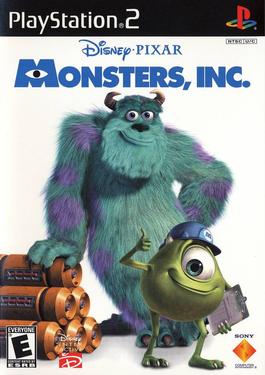
The Game Boy Advance (GBA) is a 32-bit handheld game console developed, manufactured and marketed by Nintendo as the successor to the Game Boy Color. It was released in Japan on March 21, 2001, in North America on June 11, 2001, in the PAL region on June 22, 2001, and in mainland China as iQue Game Boy Advance on June 8, 2004. The GBA is part of the sixth generation of video game consoles. The original model was followed in 2003 by the Game Boy Advance SP, a redesigned model with a frontlit screen and clamshell form factor. A newer revision of the SP with a backlit screen was released in 2005. A miniaturized redesign, the Game Boy Micro, was released in September 2005.

The Game Boy Color is an 8-bit handheld game console, manufactured by Nintendo, which was released in Japan on October 21, 1998 and to international markets that November. It is the successor to the Game Boy and is part of its product line. Critics like IGN consider it more akin to a hardware revision than a next generation product.

Mario Kart: Super Circuit is a 2001 kart racing game for the Game Boy Advance (GBA). It is the third Mario Kart game and retains its predecessors' gameplay: as a Mario franchise character, the player races opponents around tracks based on locales from the Super Mario platform games. Tracks contain obstacles and power-ups that respectively hamper and aid the player's progress. Super Circuit includes various single-player and multiplayer game modes, including a Grand Prix racing mode and a last man standing battle mode.

The Legend of Zelda: Oracle of Seasons and The Legend of Zelda: Oracle of Ages are two 2001 action-adventure games in The Legend of Zelda series, developed by Flagship and published by Nintendo for the Game Boy Color.

Donald Duck: Goin' Quackers is a platform video game developed and published by Ubi Soft for various consoles and Windows-based personal computers. A different game with the same title was first released for the Game Boy Color, as well as on Game Boy Advance, the latter being given the title Donald Duck Advance.

Pokémon FireRed Version and Pokémon LeafGreen Version are 2004 remakes of the 1996 role-playing video games Pokémon Red and Blue. They were developed by Game Freak and published by The Pokémon Company and Nintendo for the Game Boy Advance. FireRed and LeafGreen were first released in Japan in January 2004 and in North America and Europe in September and October 2004. The games are part of the third generation of the Pokémon video game series and hold the distinction of being the first enhanced remakes of previous games within the franchise.

The Game Boy Player (DOL-017) is a GameCube peripheral developed by Nintendo which enables it to play Game Boy, Game Boy Color, and Game Boy Advance cartridges, allowing those games to be played on a television.

Sonic Advance is a 2001 platform game developed by Dimps and published by Sega for the Game Boy Advance. It was the first Sonic the Hedgehog game released on a Nintendo console with Sonic Adventure 2: Battle on the GameCube, and was produced in commemoration of the series' tenth anniversary. The story follows Sonic, Tails, Knuckles, and Amy as they journey to stop Doctor Eggman from taking over the world. Controlling a character, players are tasked with completing each level, defeating Eggman and his robot army, and collecting the seven Chaos Emeralds.

Banjo-Kazooie: Grunty's Revenge is a 2003 platform game by Rare for Nintendo's Game Boy Advance (GBA). It is the third instalment in the Banjo-Kazooie series and takes place between the events of the Nintendo 64 (N64) games Banjo-Kazooie (1998) and Banjo-Tooie (2000). In Grunty's Revenge, the evil witch Gruntilda travels back in time to prevent the events of Banjo-Kazooie from happening, and the bear Banjo and his bird friend Kazooie set out to stop her. Grunty's Revenge retains the focus on collecting items and most of the other game mechanics from its predecessors, but is presented in 2D rather than 3D. Aside from the main game, players can also access minigames such as fishing and target shooting.

Rugrats in Paris: The Movie is a video game based on the 2000 animated movie of the same name. The game follows the adventures of the Rugrats in a European theme park. A console version of the game was released in 2000, for the PlayStation, Nintendo 64, and a handheld version for Game Boy Color. A version for Microsoft Windows was later released in 2001. The console version's gameplay is similar to Rugrats: Studio Tour, but Paris’ attractions sometimes have minigames too. The handheld gameplay is a side-scrolling platformer. The Windows version's gameplay is an adventure game in which the player must find Chuckie's Wawa Bear.

The Pinball of the Dead is a pinball video game developed by Sega's Wow Entertainment division and published by Sega in Japan and THQ in North America. It was released for the Game Boy Advance on June 19 and July 4, 2002, in North America and Japan, respectively. Based on Sega's The House of the Dead series of light gun games, particularly The House of the Dead and The House of the Dead 2, the game contains three tables and includes a "Challenge" mode. Full-motion video sequences and audio samples from previous games were also added. The game was first announced during the 2001 Nintendo Space World. Composer Hitoshi Sakimoto was involved with making the game's music.

The Legend of Zelda: A Link to the Past and Four Swords is a compilation of two action-adventure games co-developed by Nintendo EAD and Capcom and published by Nintendo for the Game Boy Advance. The game was released in December 2002 in North America and in March 2003 in Japan and Europe. The cartridge contains a modified port of A Link to the Past, originally released for the Super Nintendo Entertainment System in 1991, and an original multiplayer-only game titled Four Swords, which serves as the 9th installment in The Legend of Zelda series.

Mat Hoffman's Pro BMX is a BMX video game endorsed by Mat Hoffman and the first game to be published by Activision under the Activision O2 label. It is similar to the Tony Hawk's series and competed directly with Acclaim Entertainment's Dave Mirra Freestyle BMX. Despite a planned release in fall of 2000, the game was released in May 2001 for the PlayStation and Game Boy Color, followed by Dreamcast, Microsoft Windows and Game Boy Advance.
This is a list of video game accessories that have been released for the Game Boy handheld console and its successors. Accessories add functionality that the console would otherwise not have.

Moto Racer Advance is a motocross racing game developed by Adeline Software International, produced by Delphine Software International and published by Ubisoft for the Game Boy Advance. It was released in 2002 in PAL regions on October 4 and in North America on December 4. It is part of the Moto Racer series and was the last game to be developed by Adeline Software and also the last with any involvement from Delphine Software.

Banjo-Pilot is a 2005 kart racing video game for the Game Boy Advance (GBA) and the fourth instalment in Rare's Banjo-Kazooie series. It plays similarly to the Mario Kart series by Nintendo: the player races one of nine playable characters around tracks, attacking other racers with bullets and collecting power-ups. The game features a number of single-player and multiplayer modes, such as time attack and item hunts. Unlike other kart racing games, characters control airplanes instead of go-karts.

Monsters, Inc. is a 2001 platform game based on the 2001 film of the same name released for Game Boy Color, Game Boy Advance, and PlayStation 2. The Game Boy Color and Game Boy Advance versions of the game were released in October 26, 2001 in North America and in February 1, 2002 in Europe. The PlayStation 2 version was only released in North America in March 20, 2002. The Game Boy Advance version was also released on a Twin Pack cartridge bundled with Finding Nemo in 2005.

Wendy: Every Witch Way is an action platform video game published by TDK Mediactive and developed by WayForward Technologies for the Game Boy Color in 2001. The game centers on Wendy the Good Little Witch from the Casper the Friendly Ghost series. Wendy accidentally opens her aunts' chest containing magical stones, which upset the gravity of a floating castle that crashes onto her house. The player controls Wendy through four worlds with sixteen levels, with each world having three side-scrolling levels and one horizontal shooter stage. Inserting the game in the Game Boy Advance unlocks a new world exclusive to the console.

Pokémon Crystal Version is a role-playing video game developed by Game Freak and published by Nintendo for the Game Boy Color in Japan in 2000 and internationally in 2001. The game is an enhanced edition of the 1999 titles Pokémon Gold and Silver, commonly referred to as the 'second generation' of games in the Pokémon franchise. Crystal featured several additions to the core gameplay of its predecessors, including additional story elements, the inclusion of the Battle Tower, the option to play as a male or female player character, visual enhancements to the sprite animations of Pokémon, and other minor fixes and quality of life improvements. The Japanese version of the game also showcased the capabilities of the Mobile System GB, a peripheral released to add mobile phone networking, but was not distributed outside of Japan.



















